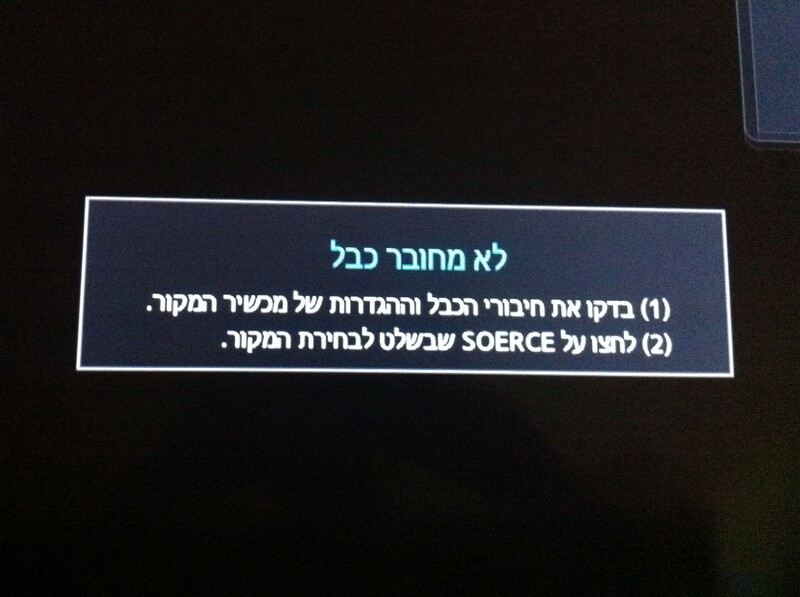4 June 2013

Under a Gaza City window, a sign for a dentist’s office, likely dating from before 1948, is in Arabic, English and Hebrew.
The Hamas-run Palestinian Authority in the besieged Gaza Strip made headlines earlier this year when it decided to make the Hebrew language a compulsory subject in the territory’s schools.
The move was surprising, given that there is virtually no direct contact between Palestinians in Gaza and Hebrew-speaking Israelis, and just months earlier Palestinian resistance organizations in Gaza had fought back fiercely against the latest Israeli aggression.

Boxes of produce with Hebrew writing, imported from Israel, are visible in all of Gaza’s markets.
There is some background to this: some Hamas leaders learned to speak Hebrew in Israeli prisons, and thousands of older Palestinians in Gaza are conversant in Hebrew as a result of having worked in Israel as laborers when that was still a possibility.
Arabic and Hebrew have a lot of similarities and, as the BBC reported, the students learning it at school “seem to have taken to it quickly.”
“It is very easy,” 14-year-old Nadine al-Ashi told the BBC. “It is easier than English, it is not difficult at all.” That matches my own experience as an Arabic-speaker who studied Hebrew. If you know Arabic, Hebrew will follow quickly.
Yet during my visit, I did not detect any traces of Hebrew in Gaza Arabic as one finds among Palestinian citizens of Israel, where quite a few Hebrew loan words and idioms have come into day-to-day spoken Arabic.
But after my visit to Gaza, I think there’s another reason that the decision to teach Hebrew might not be so surprising after all: the Hebrew language, though not used in Gaza, is visible everywhere, evidence of the ongoing colonial and occupier-occupied relationship between Israel and the Gaza Strip.
Hebrew is everywhere you look in Gaza
With Gaza’s forced dependency on goods imported from Israel (except for those that come through tunnels), Israeli goods – labeled in Hebrew – are ubiquitous.
I also saw some Hebrew graffiti left by occupation forces on Israeli-built fortifications near the Rafah crossing – but I was not quick enough with the camera to get pictures.
During my visit no one commented specifically on the presence of Hebrew (as opposed to Israeli goods which were a topic of discussion).
Is it simply a fact of life under Israeli occupation and siege that people living in Gaza don’t notice any more?
I found it fascinating, and these photos show some of the many places where Hebrew appears in Gaza – just about everywhere you look.

There are few alternatives to Israeli products in the Gaza Strip. Israel allows imports — because they benefit its companies — while preventing Gaza’s export trade.

Israeli chocolate milk at the Abu Dallal supermarket in Nuseirat.

In Gaza City’s second-hand clothes market: a cast off t-shirt from a Zionist youth movement depicts all of historic Palestine as belonging to Israel.

Many vehicles in Gaza, imported second-hand from Israel, still display stickers and decals in Hebrew.

Access covers all over Gaza City sidewalks still say “Ministry of Communications” (misrad hatikshoret) in Hebrew.

A door lock in Maghazi refugee camp.

Maximum and minimum - in Hebrew.

Fire extinguisher in a Gaza City building.

When I tried to configure the TV in my hotel room, it gave me instructions in Hebrew.

Because Internet service in Gaza comes via Israeli service providers, google.com often redirects to google.co.il, rather than “Google Palestine” (google.ps).





Comments
This is really sad
Permalink Mica replied on
To be compelled to learn the invader's language
Gazans learning Hebrew
Permalink ben replied on
It is probably a force for peace for Gazan children to learn Hebrew. Israeli kids likewise can choose to learn Arabic at High school. Until about twenty years ago there was no problem in people coming from Gaza to work in Israel and Israelis going to Gaza, for trips, to spend money buying products of various kinds. The route to peace does not lie in teaching children of the virtues of martyrdom but in co-operation and understanding each other is the first step. One of the unfortunate effects of the rise to power of Hamas is that it has been much more difficult for Palestinians to come into Israel to work which has been counterproductive to Palestinians.
Hebrew in Gaza
Permalink Carol Scheller replied on
Hebrew was taught in Gaza public schools until the arrival of Yassir Arafat, who removed it from the curriculum. It has been taught since 1994 in this private school, where I studied Arabic in 2007 and taught English in 20011-2012 : http://npacl.com/ . One of my students works in a photocopy center where he must talk regularly on the phone with Israeli suppliers of their paper - he needs Hebrew or English to do so. Gazan businessmen do better if they know Hebrew. I do not agree with Mica : to my mind, in many situations in the world, it is vital to master the language of the oppressor in order to access and provide information and to make oneself as visible and active as possible. On a person to person level, being able to talk with someone you thought was your enemy and discover them as an individual goes a long way towards changing mentalities. The first step is to be able to talk to them in their own language.
French Canadians are
Permalink Lee replied on
French Canadians are recognized as a distinct
society legally, because they refused to
assimilate the languages. Signs in Quebec
are in French and enforced by the
language-police, this enabled them to hold on
to their distinct identity. Palestinians need to
do the same to keep their identity, and NOT
assimilate.
מה רע בזה ? :-)
Permalink Anonymous replied on
מה רע בזה ? :-)
!זה דבר טוב
Permalink Neil Schipper replied on
!זה דבר טוב